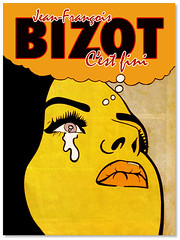The Novaplanet.com obituary to Hector Zazou led to my much belated discovery that French tastemaker Jean-François Bizot died one year ago on the same day as Zazou (that’s how I found out). If your new to Bizot, and you have money to spare, go to an online shop and buy the book Underground, l’histoire and the accompanying cd Underground Moderne.
On Zazou, Bizot said:
- “In England they have Peter Gabriel, in America they have David Byrne, in France we have Hector Zazou.” See my theory of equivalents and synchronicity.
David Byrne’s obituary of Bizot.
- “Later, in the 80s, [Bizot] and some others started Radio Nova. At various periods, it might have been the best radio station in the world. No joke. They played alt-rock before there was such a thing, Raï, African pop music, Chanson, Latin American music, hip hop, and experimental music. We all wanted to hear it, and this was where we could. Finally.”[1]
The Independent‘s obituary.
- “Jean-François Bizot had an enormous influence on the cultural life of France over the past 40 years. Between 1970 and 1975, and again between 1979 and 1994, he was at the helm of the counter-culture monthly Actuel. This started out as a French take on the underground press, not too far removed from the Village Voice and the Los Angeles Free Press in the US, or Oz and the International Times in the UK, but eventually evolved into required reading not so much for the hippies as for the hip crowd.”[2]
From the CD Underground Moderne (with YouTube links where available)
- Ghost Rider (Suicide) [3]
- Mushroom (Can)[4]
- Gypsy Love (Silver Apples)
- King Tubby Meets the Rockers Uptown (Augustus Pablo)[5]
- Solo/from The Film Der Tote bin ich (Irmin Schmidt)
- Sweet Surrender (Tim Buckley)[6]
- Le Voyageur (Heldon)
- Chrysler Rose (Dashiell Hedayat)[7]
- Fohat Digs Holes In Space (Gong)[8]
- Comme à La Radio (Brigitte Fontaine; Areski; Art Ensemble of Chicago)[9]
- Revolutionary Words (Mutabaruka)
- You Play For Us Today (Agitation Free)
- Peaches En Regalia (Frank Zappa)[10]
- Birds Lament (Moondog)[11]
- One Nation Under A Groove (Funkadelic) [12]









